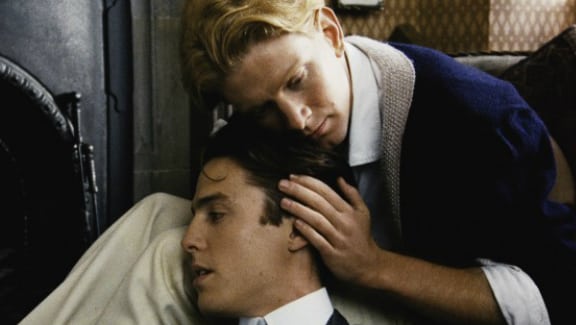Eye For Film >> Movies >> Maurice (1987) Film Review
Maurice
Reviewed by: Jennie Kermode

EM Forster's tale of young men wrestling with the stigma attached to their sexuality was originally written in the 1910s, an era when attitudes were slowly becoming more liberal and real social progress seemed to be just around the corner - before fascism swept across Europe. James Ivory's film adaptation was released in 1987 in a similar climate - before Clause 28 sought to stifle discussion again. They have a shared underlying character that goes beyond their treatment of the same story. Despite the joy to be found in Ivory's adaptation, there is here something of the melancholy to be found in his more recent Call Me By Your Name. There's also a vital class-consciousness that goes beyond homophobia to hint at a deeper malaise.
The titular Maurice, played by James Wilby at a time when most straight actors were still afraid to take on gay roles, experiences first love at university; Forster's book set the stage for many similarly themed romances and draws on stereotypes about the sons of the rich that date back far before his own time, but here Wilby's nervous, disorientated approach makes it feel fresh and overwhelming as it is for anyone when it's actually happening. The object of his affections is Clive (Hugh Grant in his first major film role); but for all the intimacy they enjoy, it soon becomes clear that they're not looking at it in the same way. Time away gives Clive the opportunity to reflect, and he comes back determined to marry so that he can continue to enjoy the privileged life for which he is destined, dismissing his involvement with Maurice as a youthful fling. Though Grant's performance is sufficiently nuanced to make us question the truth of this, Maurice struggles with the thought of leading a life of deception - and when he finds a new love, he becomes determined to chart a new course.

Exploring relative experiences of privilege and the particular terror that those who enjoy it can experience at the thought of giving it up, the film juxtaposes the advantages of wealth with the greater honesty that the poor can afford. Maurice's own hypocrisy is exposed in a key scene when his working class boyfriend makes it clear that he's not willing to be a dirty little secret; yet there's also an awareness of the very real risks all three men face, at a time when gay sex attracted lengthy prison sentences. As always, Ivory directs with an eye for the beauty of England's heritage but doesn't let all those gleaming surfaces distract from the ugliness of much of what goes into maintaining their myths.
What's really revolutionary about this film is the way Ivory photographs male bodies in what were, by the standards of mainstream cinema at the time, quite explicit sex scenes. This is one of the first occasions in Britain's cinematic tradition - outside pornography - where we see male bodies sexually objectified, explored as things of beauty rather than as vectors for action. The effect was then quite startling, not least because it turned the familiar power dynamics of cinema upside down. This reflects a fascination with power and the implications of homosexuality on power dynamics that is also intrinsic to the tale. There's a hint that Clive's retreat into heterosexual behaviour - and, additionally, his choice of an intellectually vacant wife - represents a fear of being party to any relationship forged on equal terms. Maurice, meanwhile, must set aside his own class privileges and be willing to explore revolutionary notions of equality if he is to enjoy the particular kind of freedom that comes with criminal integrity.
A landmark in its time, this is a film that still has a great deal to say today, and its historical comment makes it particularly interesting to anyone with an interest in the history of homosexuality or masculinity in Britain. It's also a genuinely moving romantic film, as beautifully made as all of Ivory's work, sensitive and intelligent.
Reviewed on: 22 Jul 2018

















